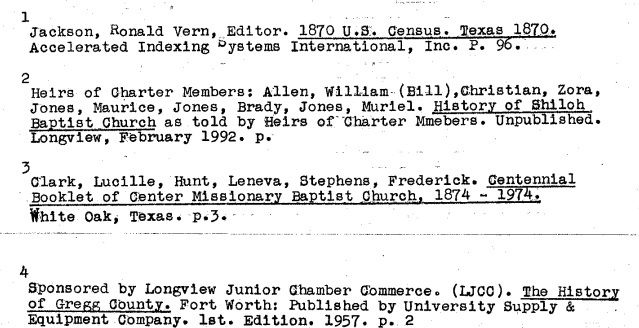Rev. John
Baptist, according to the United States 1870 census, was an African American
who lived in Liberty County, Texas. He had a wife, Peggy, and no children. According
to the heirs of the charter members of Shiloh Baptist Church, Rev. Baptist was
a traveling minister who went from place to place and organized churches for
recently freed slaves. The slave-master, Mr. Gedeon Christian secured the
services of Rev. Baptist to aid blacks of the Shiloh Community in organizing
Shiloh Baptist Church. Three years later (1874), he organized the neighboring
Center Baptist Church in the Camp Switch.
Shiloh
was a small rural community comprising of only a portion of Gregg County’s 284
square miles in 1882. While farming was the chief industry, domestic workers,
logging, and saw-milling were minor industries that provided employment for
black residents in rural communities. There were no known businesses or public
institutions in the Shiloh Community during this era. Shiloh Baptist Church was
the only black church in the community. Later in 1885, a 20 X 30 ft. one room
frame school building was used for church services by whites in the neighboring
White Oak community.
After the
Civil War and after the slaves learned that they were fee (June 19, 1865),
there were many problems and hardships. Most slaves had not learned to read or
write. Texas declared that black education would have to be funded by black tax
payers. However, there were few black property owners and jobs to fund their
own schools. As a result, black children were denied an education. It was
during this time, the 1870s and up to the 1890s that school was held in Shiloh
Baptist Church. It is not known how many
students attended the Shiloh Church School, but it was open to all children of
the community regardless to religious beliefs.
The
Shiloh Baptist Church Cemetary is active and adjacent to the church property.
The cemetery was established in 1892. It is not known who the first person was
that was buried there. The Shiloh Historical Research Committee surveyed the
Shiloh Cemetary and discovered that there were unmarked graves or marked only
with a rock as a headstone with no indication of who was buried there.
Notes taken from the following sources:






No comments:
Post a Comment